What is Coeliac Disease?
Coeliac disease (or Celiac in North American English spelling) is an autoimmune disease in which the lining of the small intestine is damaged by gluten – a protein found in wheat, rye, and barley. An autoimmune disease is a condition in which your immune system mistakenly attacks your own body. In people with coeliac disease, the immune system launches an attack on the lining of the small intestine in response to gluten proteins in the body. This attack causes damage to the tiny, finger like projections called ‘villi’ that line the intestine and assist with absorption of nutrients. The villi become inflamed and flattened, thus reducing the amount of available surface area of the bowel for food to be absorbed.

Coeliac disease is a serious medical condition, and if left untreated or poorly controlled can lead to further complications such as:
- Chronic systemic inflammation
- Poor nutrition and malabsorption of nutrients
- Osteoporosis
- Infertility and pregnancy related complications
- Depression
- Dental problems
- Chronic poor health
- Lactose intolerance
This disease can affect people from all ages and genders and can develop at any age from infancy to adulthood. It tends to run in families, you are 10x more likely to develop coeliac disease if you have a parent or sibling with the disease, so if you are diagnosed you should inform your relatives that share your genes so that they can be tested. It is important to be tested BEFORE going on a gluten-free diet as this can cause false negative test results as discussed below.
Symptoms
- Gastrointestinal symptoms such as
- Constipation
- Diarrhoea
- Nausea
- Vomiting
- Bloating and Flatulence
- General pain or discomfort in the tummy
- Fatigue
- Weight loss or gain
- Irritability
- Depression
- Bone or joint pain or stiffness
- Easy bruising
- Itchy and blistering skin rash
- Swelling of the mouth or tongue, mouth ulcers (recurring) and other dental problems
- Fertility problems
- Growth problems, failure to thrive, developmental delay or delayed puberty
Many of these symptoms can occur in conditions other than coeliac disease, such as wheat intolerance, non-coeliac gluten sensitivity, or irritable bowel syndrome (IBS). However, coeliac disease is widely under diagnosed so it is important to be considered as a possible cause for these symptoms.
Diagnosis
- Blood tests
- Used to screen for coeliac disease
- Measures the number of antibodies your body has produced in response to gluten
- You must be eating gluten for at least 6 weeks for sufficient antibodies to be detected
- Antibody detection does not confirm diagnosis, this can only be confirmed with a small bowel biopsy
- Small bowel biopsy
- Essential to confirm the diagnosis
- Requires gastroscopy; is a procedure that occurs under light anaesthetic where a thin, flexible tube is inserted through your mouth to your small bowel. This procedure takes about 10 minutes
- You must be eating gluten for at least 6 weeks for accurate test results
- The biopsy is examined for signs of damage to the villi
- If biopsy results are positive, coeliac disease is diagnosed
- Genetic tests
- May be requested if blood tests and small bowel biopsy is uncertain (may happen if you did not eat enough gluten prior to testing)
- A negative genetic test rules out coeliac disease but a positive genetic test does not confirm diagnosis
- A genetic test can only confirm a predisposition to coeliac disease
- This test is not affected by the amount of gluten in your diet. The process may be via blood testing or taking a small scraping from the inside of your cheek
Management
There is no cure for coeliac disease, it can only be managed through a strict, lifelong gluten free diet. Removing gluten from the diet, regardless of how mild your symptoms are, is the only way to allow the small bowel to heal and prevent further damage and potential further complications. A yearly medical review is recommended for patients with coeliac disease to check for antibodies in the blood and monitor small bowel healing.
The Gluten Free Diet
Starting a gluten free diet involves education and the development of new skills. Your GP and dietitian can provide guidance on what to eat and how to read food labels. Essentially, you need to avoid foods containing gluten protein:
- Wheat
- Rye
- Barley
- Oats*
*Oats are highly controversial – there is currently no test for the protein in oats that may trigger an immune response to gluten. Additionally, oats are often processed in the same factories as gluten containing grains and may contain gluten through contamination. Uncontaminated oats are well tolerated by most people with coeliac disease, but not all. This is something you will have to trial for yourself.
So, What Can I Eat?
- Naturally gluten free foods
- Fruit and vegetables
- Legumes
- Fats and oils
- Meat (including poultry and seafood), eggs and milk
- Gluten free grains – rice, corn, quinoa
- Products labelled gluten free
- In Australia, you can trust that products labelled gluten free are completely free from gluten by ingredient and contamination
- Products that are gluten free by ingredient
- You will learn to easily interpret ingredient lists on a gluten free diet
- If any product IS wheat, barley or rye or is DERIVED from wheat, barley or rye it is legally required to be listed in the ingredients list. This does not protect you from cross contamination however, you also need to look out for allergy statements such as ‘may contain traces of gluten’.
As coeliac disease and gluten sensitivity is becoming more widely acknowledged, many replacement items are popping up on the market. Today, you will have no trouble finding gluten free options for pantry staples such as bread, pasta, and flour. There are also many gluten free snack items, ready-made meals, and condiments available in most grocery stores.
Alcohol does not require the labelling of all ingredients in Australia so this is something you will need to take care with. For example, all regular beer contains gluten. Discuss with your GP and dietitian to learn what is safe for you.
For support, make an appointment with one of our dietitians. They can
- Explain what a gluten free diet involves and why it is important
- Help you plan and develop your new diet
- Ensure you diet is balanced and not lacking in any essentials
- Determine if supplementation is required for your diet
- Provide education and advice in food label reading
For further support, you can contact Coeliac Disease Australia or visit their website.
The information in this article has been adapted from:
Coeliac Australia. Coeliac Disease. Retrieved from Coeliac Australia: https://www.coeliac.org.au/coeliac-disease/
Health Direct. (2020, January). Coeliac disease and gluten intolerance. Retrieved from Health Direct: https://www.healthdirect.gov.au/coeliac-disease
This article was written by April Stevens BSc. MD student.
14th October 2020.


